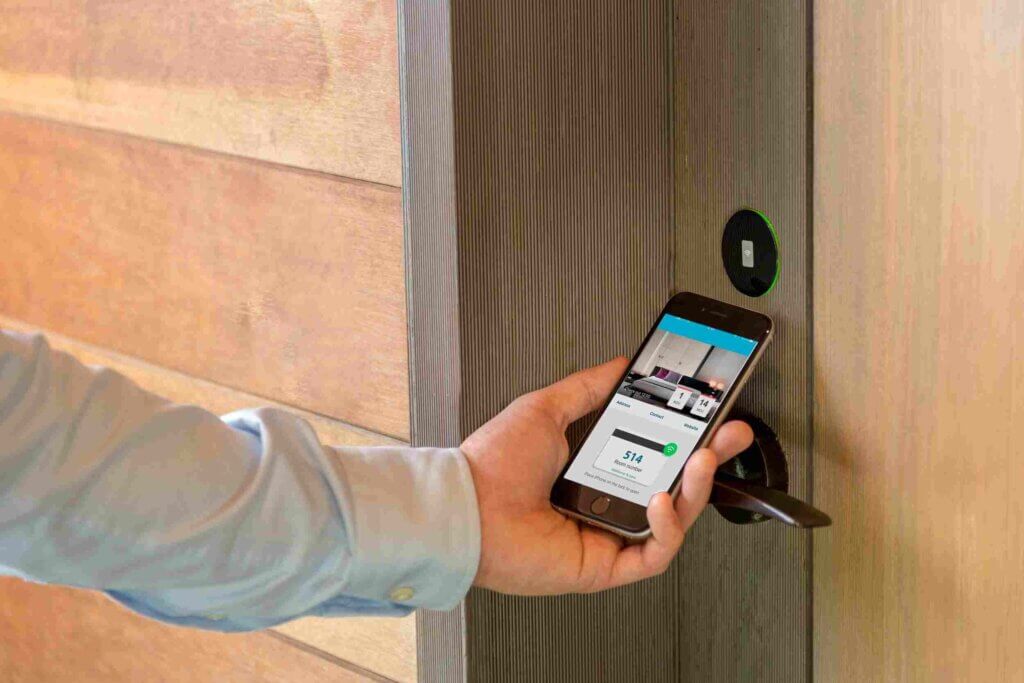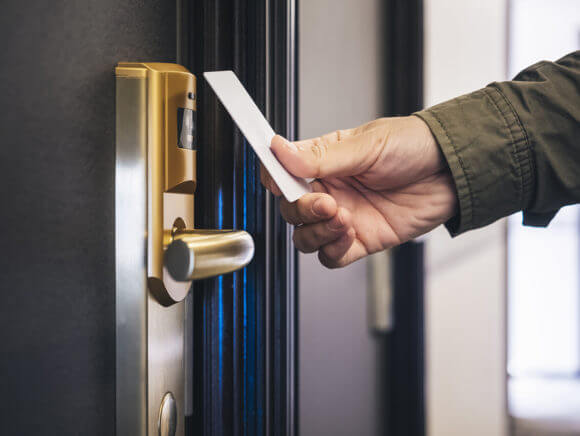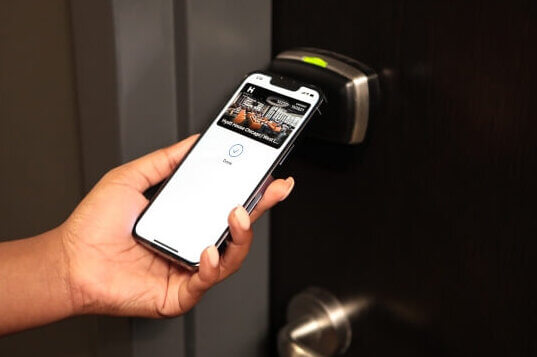User Preferences: Key solutions in hotels and connection to the online check-in process

Recently we had an encounter with a client, interested in implementing an online check-in and automated reception, who was keen on keeping his key solution, even though it’s not the most “modern” one.
He explained that he is well aware of the challenges it might bring, but the current way (using classic old-school metal keys) is just a part of the whole experience at his lovely facility.
Completely legit, we though. 👍
And a no big deal, because we at MyStay are able to provide a solution for a completely automated reception, including a key pick-up, nevertheless.
But that got us thinking: Is there actually any preferred way to open the room when staying in a hotel?
Type of key solutions currently being used in hotels
Mechanical door locks = Metal keys
The absolute old-school classic. For some hotels, they are a perfect choice because they can add to the whole experience. (As with our client mentioned above). They are also easy to use and fairly cheap to implement.
However, they entail a lot of disadvantages and have been for many years now, on its way out.
The most notable disadvantages are that the keys can be copied, have no extra function and may be quite inconvenient for certain groups of people (elderly, disabled).
Magnetic key cards
This method uses a magnetic strip. The magnetic strip stores information and needs a magnetic reader to access the information. The card needs to be swiped on the reader so that the information is transferred to the reader and the door is unlocked.
A disadvantage of magnetic key cards is that the information inside can be erased in case the card is exposed to a place where a stray magnetic field is present. For example when the guest puts the card in the same pocket as his phone.
Even though majority of the hotel chains operate using this technology, it is on its way out quite rapidly as the cards are reaching the end of their life cycle. The encoders are getting old and very expensive. Automated receptions are still possible, but for every single hotel it makes more sense to upgrade their key solution and then look into automating. And, based on the reports from our [key-provider] partners, this is exactly what is happening.
Plastic RFID Key Cards

Easier for guests to use than magnetic key cards. They are more secure and durable as compared to their magnetic counterparts. They do not get affected by their environment and offer a secure place to store the information where hackers cannot reach.
A problem can occur, though, in case of a power failure (an RFID lock cannot be opened).
Also, even though the RFID cards are more secure than magnetic ones, it is still not the best choice security wise.
Code locks
What’s great about this system is that the user only needs to memorize a correct sequence of digits to enter the room.
No other device or a card needed means the guest won’t get locked out of his room. No cards to get lost or stolen. meaning also no extra costs for buying and replacing them.
There is an option to use multiple codes for one lock and this method is fairly secure. An issue might arise with memory problems, access for disabled people or unauthorized people getting the code.

This method is also a bit more versatile and it can be combined with the e-key (mobile key) solution, where a code doesn’t need to be used.
Mobile keys
Mobile keys are on the rise and seem to be the the number one consideration for most hotels of all types. A lot of big names in the hotel industry also already committed to adoption of this technology.
There are a few types of mobile keys: NFC, Bluetooth and IoT keys.
Mobile keys based on NFC technology are used mainly through mobile applications. The device with the key needs to be put in close proximity to the reader. It is basically an upgrade of the RFID solution. The disadvantage is that the guest needs to download an app in order to use this key and log it in.
The Bluetooth mobile key doesn’t need to be held by the reader, the internet connection is also not necessary. For this type an app has to be downloaded as well, though. From the market reports, this method is adopted rather marginally by hotels.
IoT mobile keys are the most interesting and future proof. The device does not need to be in a close proximity to the reader, the doors can be basically opened from anywhere. All the data is verified in the cloud and no app is required.
It is easy to see why mobile keys are gaining a lot of popularity – mainly among the users. The main argument is the convenience, security and efficiency. When e-keys are combined with the mobile check-in option the hotel has a great opportunity to significantly increase the guest satisfaction and experience.

The implementation process and the costs may seem to some as a disadvantage. The whole technology is quite new and not all bugs might yet be accounted for.
Furthermore, there may also be a need of an app download and an availability of a smartphone with a charged battery. For IoT mobile keys, the internet connection is. also a must.
…
If you are interested in a more detailed list, here is an awesome comprehensive chart made by our partners at 4SUITES:

What are the preferences of users?

The 216 participants (92 females and 124 males`) were a combination of hospitality professionals, tech professionals and “ordinary” people outside of the hospitality field.
The average age of the respondents was between 30-40 years old and they came from various regions across the world.
(Please keep in mind that our methods were not scientific and the results will be biased and skewed by – the type of audience asked, the age and background of respondents and their own subjective preferences.)
The Results?
The results of the poll are surprising and not surprising at the same time.
Even though mobile keys are not yet widely adapted, meaning not tried and tested by the users, almost half of the respondents would prefer them to other types of keys. Since mobile devices offer so many other options and prove to be the most useful companion in day to day life, this result is not surprising at all.
The remaining half of the preferences are distributed among the Plastic keycards, Code locks and Metal keys.
What is surprising, at least to us, here at MyStay, is the relatively low interest in the code lock option. Needing no other device besides ones’ memory is probably not as highly appreciated as we would expect it to be.
Plastic keycards are on the other hand still a very popular choice.
Metal keys? Well, let’s not drag them even further while they are on their farewell journey. 👋

Some readers might find interesting the difference between preferences of each gender.
For both genders, metal keys weren’t a big choice, however male respondents still prefer them to the code locks.
The clear winner for male respondents are e-keys (mobile keys), for female respondents it is the keycard option. The e-keys are the second most preferred option for females, just as keycards are for males.
The most apparent difference in preference is the code lock, where only 3% of men would choose it, compared to 21% of the women.

How the online check-in and automated reception tie in with various types of key solutions?
Metal keys
When comparing all of the options, metal keys may seem to most as quite outdated. They also seem to be in direct contrast with the modern automated reception trope.
However, a completely automated, contactless guest journey is still possible. With MyStay, the solution is to combine the WebApp, Self Check-in Kiosk and a Key-box / E-box. The guest can check-in from the comfort of their home, or on-site with the help of a Self check-in Kiosk and pick up their key through an E-box. Simple.

Keycards
Good news for the keycard method is that it is still very popular among users. It is also already widely adapted, well known and basically “tried and tested” throughout the years. They are not challenging to use and do not require any extra effort or devices on guests’ side.
What’s even better news is, that a fully automated reception is also possible, without any issues. The solutions is to combine the Self check-in Kiosk with a Keycard dispenser.

The dispenser, which serves also as an encoder allows for a complete automation of the check-in and also the check-out process. It is also able to provide a replacement card in case the guest lost his or it stopped working for some reason.
A bunch of MyStay clients already use this solution with fantastic results. You can read about our recent addition – Hotel Impozant here. 🌟
Code locks
A code lock could be considered a middle step towards full automation. The full automation is possible if a code is provided as a part of an online check-in process. With MyStay, the guest again uses the WebApp or the Light Kiosk to check-in, after which he receives the code to enter his room.
You can see it how it works at this stunning apartment hotel managed by OREA Hotels & Resorts here.
E-keys
E-keys in the form of mobile keys seem like the ideal scenario for a completely seamless and futuristic guest journey. Combining mobile keys and an online check-in is an absolute no brainer. When a hotel chooses to implement this technology, the only logical thing to do next is setting it up together with a completely contactless reception, including a digital check-in, upsell and check-out.
And we are all in for that. 🤫
…
All in all, the results of our poll asking about user preference towards key solutions were not surprising at all. And we are very excited to know, that whichever approach the hotel chooses, innovation or tradition, we are able to provide a solution for a completely automated reception.